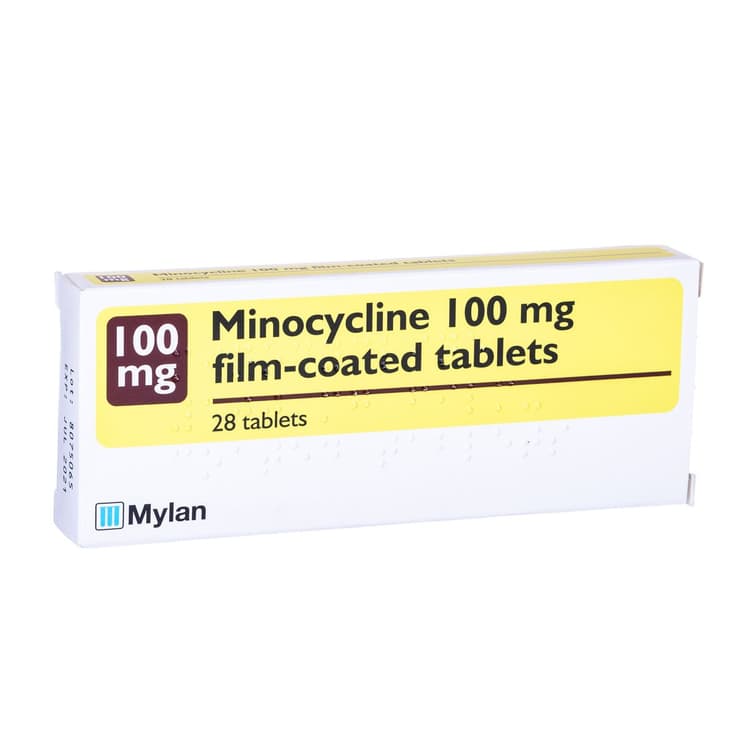Christmas Delivery: Please note orders placed after 2:30pm on 18th December may be delivered after Christmas.
- Home
- Chronic Conditions
- Acne Treatment
- Minocycline
Minocycline

Images for illustrative purposes only
Start Your Expert Consultation
Minocycline is an antibiotic used for the treatment of acne and a wide variety of infections. It may also be used along with other medications to treat severe acne.
- Anti-inflammatory properties
- Kills bacteria that cause spots
- Offers relief from acne flare-ups
- Genuine medication
- All drugs sourced in the UK
More information
A Doctor's Overview
 | GP and surgeon, Dr Shane Charles (MBBS, MRCS, PgDip SEM) provides a simple explanation of the medication below: 'Minocycline is an antibacterial agent used in the treatment of infectious, as well as non-infectious conditions. '. If you think this is a treatment that can help you, start an online consultation now for a registered prescriber to review. If treatment is deemed suitable, they can prescribe it, and we can deliver it to you from the comfort of your own home with a range of convenient delivery and payment options for you to choose from. If you have any questions about a medication, you should always consult your doctor with any questions prior to starting treatment, to ensure that it is safe and suitable for you. |
What is Minocycline?
Minocycline Acne
Minocycline is an antibiotic used for the treatment of acne and a wide variety of infections. It may also be used along with other medications to treat severe acne. Minocycline belongs to a class of drugs known as tetracycline antibiotics.
This antibiotic treats only bacterial infections. It will not work for viral infections such as flu and the common cold. Using antibiotic when it is not needed can cause it to not work for future infections.
Patient Information Leaflet
For more information on the prescription medication patients should refer to the Minocycline patient information leaflet.
How does Minocycline work?
Minocycline is an antibiotic. It works by stopping the growth of bacteria thereby clearing the infection.
What are the benefits of using Minocycline?
Minocycline is effective in the treatment of bacterial infections. Together with other medications, it is effective in providing treatment to severe acne.
How do I use Minocycline?
Minocycline Tablets
Read the patient information which comes with the product package. It is important that you take this medication according to the instruction of your doctor.
Minocycline is best taken on an empty stomach. The medication is to be taken by mouth as directed by your doctor. It is usually taken every 12 hours, one or two hours after a meal. Take Minocycline with a full glass of water unless directed otherwise by your doctor. If you experience stomach upset while taking this medication, you should take it with food or milk.
If you are taking the capsule form of the medication. Swallow it whole. Do not lie down for at least 10 minutes after taking the medication. For this reason, it is recommended that you should not take the medication right before bedtime.
Take Minocycline 2 to 3 hours before or after taking any medication or product that contains aluminium, calcium, magnesium, iron, or zinc. These products bind with minocycline, preventing the body from fully absorbing the drug.
What is the proper dosage for Minocycline?
Minocycline Dosing
Minocycline is usually taken once every 12 hours, at least one hour to two hours after a meal.
The dosage and length of treatment of Minocycline are based on your medical condition and your response to the treatment.
What side effects can Minocycline have?
Side Effects from Minocycline
Your doctor has prescribed Minocycline because he judged that the benefit to you is greater than the risk of side effects. Many people who used this medication did not have serious side effects.
| Side Effect | Description |
|---|---|
| Black, tarry stools | Stools that are black and have a tar-like consistency |
| Blistering, peeling, or loosening of the skin | Skin that forms blisters, peels or becomes loose, sometimes with pain or itching |
| Blood in the urine or stools | Presence of blood in urine or stool |
| Blurred or double vision | Difficulty seeing clearly or seeing double |
| Bulging soft spot on the head of an infant | Swelling or bulging in the soft spot on the head of an infant |
| Chest pain, possibly moving to the left arm, neck, or shoulder | Pain in the chest that may spread to the left arm, neck or shoulder |
| Confusion | Difficulty thinking or understanding clearly |
| Diarrhea | Loose, watery stools |
| Dizziness or lightheadedness | Feeling unsteady or faint |
| Eye pain | Pain or discomfort in the eye |
| Fast heartbeat | Heart beating faster than usual |
| General feeling of discomfort or illness | Feeling unwell without a specific cause |
| General tiredness and weakness | Feeling tired or weak without a specific cause |
| Hives, itching, or skin rash | Itchy, raised areas on the skin or a rash |
| Joint or muscle pain | Pain or discomfort in the joints or muscles |
| Large, hive-like swelling on the face, eyelids, lips, tongue, throat, hands, legs, feet, or sex organs | Swelling in any of the mentioned body parts that resembles hives |
| Loss of appetite | Not feeling hungry or losing interest in food |
| Nausea or vomiting | Feeling like you might vomit or actually vomiting |
| Red skin lesions, often with a purple center | Red sores on the skin that may have a purple centre |
| Severe headache | A very painful headache |
| Severe stomach pain | Intense pain in the stomach area |
| Sores, ulcers, or white spots on the lips or in the mouth | Painful sores or ulcers in the mouth or on the lips, sometimes with white spots |
| Troubled breathing | Difficulty breathing, shortness of breath or feeling like you can't catch your breath |
| Unusual bleeding or bruising | Bleeding from unusual places or unexplained bruising |
| Upper right abdominal or stomach pain | Pain or discomfort in the upper right part of the abdomen or stomach |
| Yellow eyes and skin | Yellowing of the skin and eyes, a sign of liver problems |
Inform your doctor immediately if you have any serious side effects, such as painful/difficult swallowing, changes in your hearing, joint stiffness, pain or swelling, a sign of kidney problems, or a sign of liver problems.
Minocycline may rarely cause a serious increase in the pressure inside the skull. The risk of this side effect is greater for women of childbearing age who are overweight or who have IH in the past. Get medical help right away if you experience severe/lasting headache, vision changes, nausea or vomiting that won’t stop.
This medicine may rarely cause a severe intestinal condition due to a type of resistant bacteria. This condition may occur during the treatment or weeks to months after the treatment has stopped. Tell your doctor if you develop a diarrhoea that won’t stop, abdominal or stomach pain/cramping, or blood/mucus in your stool.
A very serious allergic reaction to this medication is rare. However, get emergency medical help if you notice any symptoms of a serious allergic reaction, including fever that does not go away, new or worsening lymph node swelling, itching or swelling, rash, trouble breathing, and severe dizziness.
Tell your doctor if you are allergic to this medication or to other tetracycline antibiotics, or if you have any other form of allergies. This product may contain inactive ingredients which can cause an allergic reaction or other problems.
Tell your doctor before using Minocycline your medical history, especially kidney problems, liver problems, trouble swallowing, or oesophagus problems.
Minocycline may make you dizzy. The consumption of alcohol or marijuana can make you dizzier. Do not drive, operate machinery, or do anything that requires alertness until you can do it safely.
Minocycline may make you more sensitive to sunlight. Limit your exposure to sunlight and avoid tanning booth and sunlamps. Use sunscreen and wear protective clothing when going outdoors. Inform your doctor if you get sunburned or develop skin blisters/redness.
Minocycline may cause live bacterial vaccines to not work as well. Do not have any vaccination or immunization while using this medication unless your doctor tells you to.
Children younger than 8 years may be more sensitive to the side effects of this medicine, especially tooth discolouration.
Tell your doctor if you are pregnant or planning to get pregnant before using Minocycline. Minocycline may harm an unborn baby. If you become pregnant while taking the medication, inform your doctor right away so you could discuss with him the risk and benefits of the medication.
Minocycline passes into the breast milk in small amounts but will not likely harm a nursing infant. Consult your doctor before breastfeeding while taking this medication.
Drug interactions may change how your medication works or increase the risk of serious side effects. Do not start, stop, or change the dosage of any medicines you are taking without the approval of your doctor.
Minocycline may interfere with some lab results. Inform the lab personnel and your doctors that you are using Minocycline.
A pharmacist's overview of the side effects of this medication and how to manage them:
 | Senior Specialist Pharmacist, Dania Al-Zarrad, provides a simple explanation of the common side effects of the medication and how you can manage them: Has similar risks to minocin mr; follow the same advice. |
How do I buy Minocycline online?
You can safely buy Minocycline online at UK Meds. You will need to have first an online consultation with a pharmacist independent prescriber before your order will be supplied. The online consultation will ensure that Minocycline is the right medication for your medical condition.
Here to help you
Our Customer Service is available Monday to Friday 9am - 5pm. If you need urgent assistance, do not use this service. Call 111, or in an emergency call 999. Visit our help section


